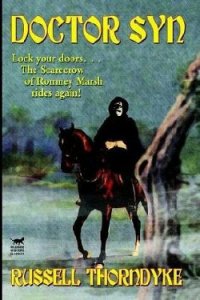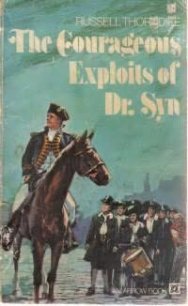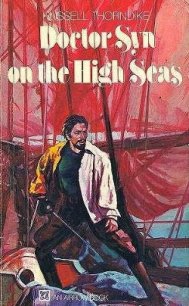The Shadow of Dr Syn - Thorndike Russell (библиотека электронных книг txt) 📗
1 A chidderer is a booky.
2 Gossip.
3 Mr. Mipps’s word for eavesdroppers.
4 Ladies’ man.
So they had ridden through the village where the Vicar made much ado about stopping and starting Red Pepper when greeting his amazed parishioners. His foot slipped many times from the iron and he held the reins as he had seen Mr. Mipps do on Lightning, Cicely watching with very bright eyes this delightful clowning for her benefit. Then they were free of the village and out upon the lonely Marsh, setting their horses towards Lympne Hill. The storm of the night before had exhausted itself with its own fury. The hill shone birght in the pale November sun, yet when it shone on Cicely’s red-gold hair and russet riding-habit, it seemed she warmed the sun to summer. They had not spoken. Indeed they had not looked at one another; but now, the last farm passed, with it went ‘dear old Doctor Syn’.
He straightened in the saddle and took command of the surprised animal. Then turning to her, deliberately took his spectacles from his nose and grinned boyishly — and they were off. The horses were as well matched as they, and neck to neck they galloped deliriously. Over this dyke and that, across broad fields, scattering the sheep, and on they sped, gathering momentum towards the Broad Dyke.
A watcher, who was ‘lookering’ his sheep and loved good horses, watched them, fascinated, clearing this wide, deep canal together in perfect rhythm, horses and riders in unison. Then straight ahead and up the slopes they climbed towards the Roman Camp, above which frowned the perpendicular wall of old Lympne Castle. Here they dismounted and let their horses graze on the lush pasture that centuries ago had been beneath the sea, while they sat down, glowing and happy, on the harbour wall where galleys once were tied, as if each to the other had belonged since those old days, united as they had been on their ride.
There they sat with all the quietness of the past about them, looking at this vast sweep of land divided from the sea by that straight wall. This was his country — here he ruled from two extremes and she sat by him like his consort.
The sun flashing on lattice panes far below brought to her mind another flashing light, and she told him what she had seen that morning early, demanding what he did and why he risked his life — for she told him she had seen the Scarecrow’s letter to her father. Gravely he asked her if she remembered the conversation at dinner the night before about the rumoured pardon of this rogue, saying that now he must do all to gain it, and since this Barsard had been an enemy of England his chance of winning it was therefore greater. She remembered, she said, but she wished to forget — and he smiled at her using his own phrase; and to all his arguments on that count she would have none, saying that she loved him as he was. She bade him be silent about his past, for all she wanted was the present — looking at him almost questioningly till he wrinkled his brows, wondering if she were finding some fault in him, though she was but marvelling at this strong, strange man who was able by sheer force of character to hide that side of himself which was his best under the cloak of age. Yet she knew that if she had her choice she would not have him otherwise — she never had, she never would. Then suddenly she began to laugh. He watched her lovely merriment and sought the answer with one raised brow. She told him how since she had been quite small she used to borrow Mr. Mipps’s spy-glass to watch him sitting on this very spot. ‘The glass was magic and brought you to me right across the Marsh.’
And now how proud she was that no one else had been with him up here….
‘Save one,’ he said. Then, seeing her quick look of wonder, told her the story of how he had first met Mipps, his other best-loved friend, and how here he had had the luck to save his life, and then not met again, till in the Caribbean Mipps had done the same for him. Her pleasure was so great to be sitting on the very spot that she turned swiftly to him, the sun behind her, shining through her loosened hair making a fiery halo round her head….
‘Then I vow I love you both so much,’ she cried, ‘I would that I could do the same for you, the pair of darling pirates that you are.’ He leant and kissed her hands — and her strong fingers caressing his arm betrayed him. For he could not stop the sudden wince of pain — and in a moment she was all self-reproach and tenderness. They must go home. His arm must be properly seen to. She herself would do it. And did he know that she was dining with him tonight? Aunt Agatha had arranged it with Mamma, who agreed it would be quite proper if Agatha went too.
He did not know — he accepted with pleasure. So, mounting their horses, they rode slowly back in tender teasing vein — loath to leave this darkening spot which had embraced so much of their lives and given them this shining hour. The sun dropped down and the Marsh died to be reborn in a thousand twinkling signals — for it was only then that Romney Marsh awoke and came to life.
* * * * *
How was it that they dined alone in that lovely Adams room? Seated one at either end of the refectory table, eyes meeting across that subtle distance only served to tautenteh reins of tehir inseparable selves. The answer was ‘Romance’, and no one knew better that Aunt Agatha how to foster that most delicate flower. But where was Aunt Agatha then? She was certainly not dining with the two disgruntled ladies at the Court House. Yet the powdered footmen there would have staked their very wigs that she was at the Vicarage, for had they not heard her ladyship’s orders? ‘Miss Gordon chaperones Miss Cicely to dine with the Vicar.’ Indeed one of their number had escorted them with a lantern to the gate. But not having eyes at the back of his head, he could not notice the old lady’s whispered farewell to her great-niece, nor that she trotted back after him across the Glebe, but that instead of going into the Court House she had deliberately set off in another direction.
The lady in question, having served to cosset her niece’s romance, had planned a little flutter on her own account, and it was towards this crowded reception that she had made her way. Seated in the place of honour of the Bar Parlour at the ‘Ship’, Miss Gordon was holding court.
Her admirers on this occasion were very much more to her taste than the stuffy old Lords of the Level who had been invited to amuse her the night before. Her reticule being well stuffed with Scottish gold, tankards were continually being refilled with Mrs. Waggetts’ special, while her gay stories and quick retorts kept the company in Rabelaisian good humour. Yet out of all this throng of fishermen, farmers, soldiers out of the new box, and village cronies in general, the casual onlooker might have noticed that her special cavalier had a pair of merry blue eyes and a popularity equal to her own. Yet in spite of the fact that she was kept so busy and was indeed enjoying herself, from time to time, and with a glow of satisfaction, she thought on her two dear romantics at the Vicarage, and wondered how they fared.
Indeed tehy were faring very well. Mrs. Honeyballs’s dinner, although they had not noticed it, had been a poem, and the present scene would have been entirely to her approval, for Cicely, having attended to the dressing of a slight wound on the Vicar’s arm, that same arm and its fellow were clasped around her, as they stood by the fire in the hall, candles glowing and moonlight shining through the windows.
* * * * *
Mr. Mipps had got over his ‘dobbin’, for he had been extremely busy and had had no time to foster it. There was Mrs. Wooley’s coffin to be attended to, and Mr. Mipps, taking a natural pride in his work, did not like to be hurried, and there had been the final details of the night’s run to be seen to, and the false run to be supervised. All this accomplished, there remained his report to the Vicar. He had some special messages to remember, and was hurrying to get these off his mind before he forgot. So occupied was he with tabulating these that he was half-way across the room before he noticed that the Vicar was indeed behaving like a flirt-man. This gave him such a shock that it was not until he was half-way out again that his weather eye told him that it registered something else out of the ordinary. He was horrified, and decided that in spite of what the Vicar was doing, action was necessary. He crept back and tried to attract the Vicar’s attention: signalling violently, scratching his own arm and pointing to his master’s, while mouthing silent protests.




